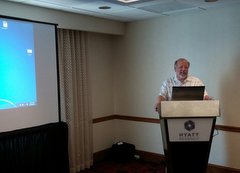
On Wednesday, May 27, 2015, Dr. Greg Alward represented both the Alward Institute and the IMPLAN group at the MCRSA Executive Committee meeting. David Kay also attended the Executive Committee meeting as a representative of the Alward Institute.
The following items were presented by Alward Institute staff at the MCRSA, May 2015:
PLENARY SESSION; May 28, 2015:
Opportunities for Research Partnerships
Gregory S. Alward, David Kay, Stephen Cooke, Linda Schick; Alward Institute for Collaborative Science.
This session discussed the creation and mission of the Alward Institute for Collaborative Science, presented the current research agenda and review progress to date, and invited the MCRSA community to collaborate with the Alward Institute on joint research projects.
In December 2014 the core Resarch & Development team within the IMPLAN Group, LLC left the company to create an independent organization, known as the Alward Institute for Collaborative Science (https://alwardinstitute.org ). This 501(c)(3) non‐profit corporation builds collaborative partnerships to discover innovative uses for a time series (1990 – present) of regional Social Accounting Matrices (SAMs) for all US counties. Our current research agenda includes:
- Assembling the Tapestry Social Accounting Matrix (SAM) Database and interregional SAMs for all US counties for 1990 – present;
- Assembling the Tapestry Modeling and Applications Database interregional Leontief‐type I/O multiplier models, marginal Leontief‐type I/O multiplier models, and canonical CGE models for all US counties for 1990 – 2013;
- Developing a virtual online Research Analytics and Visualization Laboratory for research partners to interact with the Tapestry databases;
- Extending Tapestry’s SAM framework to include wealth, capital and workforce Knowledge/Skills/Abilities satellite accounts;
- Developing Structural Path Analysis applications for identifying new markets for agricultural and forestry products;
- Adding SAMs and Applications for non‐US countries and regions (particularly in Europe and Canada) to Tapestry;
- Hosting workshops and training in using Tapestry to investigate economic development topics such as identifying regional competitive advantages for export expansion and import substitution strategies, integrating transportation infrastructure planning with endogenous economic growth analysis, monitoring the economic consequences of natural hazard events, and evaluating economic contribution and diversity.
The Alward Institute’s research and education missions are supported entirely by charitable donations, collaborative research grants and contract research studies. We are actively seeking University, government and non‐profit research partners and collaborators to expand our current research and education agendas.
ECONOMETRIC TECHNIQUES, Session 6:
- Techniques for Identifying Important I‐O Coefficients and Sectors ‐ Michigan Forest
- Products Sectors: Comparative Gross and Base Value Added and Structural Path Analys
Alward Institute for Collaborative Science:
- Stephen Cooke (attending) This email address is being protected from spambots. You need JavaScript enabled to view it.
ECONOMIC DEVELOPMENT: FOOD, WINE, AND GREEN FIELDS, Session 15:
Estimating the Value of Local Food Markets in the State of Wisconsin
Alward Institute for Collaborative Science:
- David Kay (attending) This email address is being protected from spambots. You need JavaScript enabled to view it.
- Gregory Alward (attending) This email address is being protected from spambots. You need JavaScript enabled to view it.
- Stephen Cooke (attending) This email address is being protected from spambots. You need JavaScript enabled to view it.
University of Idaho:
- Philip Watson (non‐attending)
University of Wisconsin-Madison
- Alfonso Morales (non‐attending)

